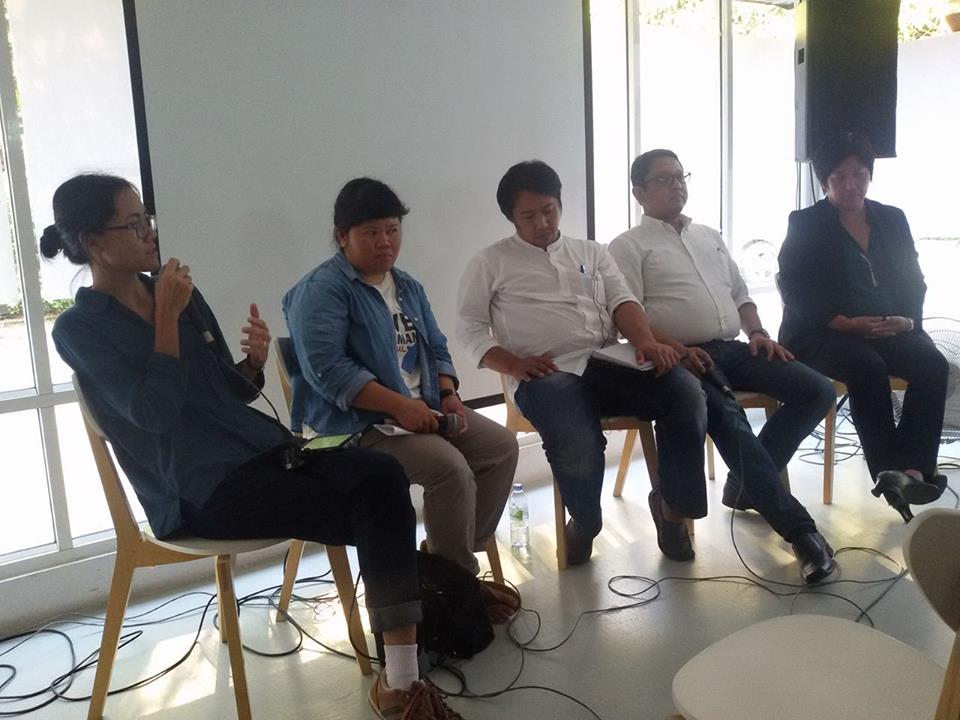While the ruling junta is showing its commitment to human rights principle at the UN’s ICCPR review in Geneva, NGO workers said the such superficial commitment is just to avoid further humiliation from international communities.
Between 13 and 14 March 2016, Thailand sent 46 delegates to attend
the second periodic report on implementation of the provisions of the International Covenant on Civil and Political Rights (ICCPR). Led by Charnchao Chaiyanukij, Permanent Secretary of the Ministry of Justice, the delegation has to answer UN experts about the current human rights situation of the country and what will be the policies to improve it.
Back to Thailand, a public forum “From Bangkok to Geneva: Engaging the Public in Thailand ICCPR Review” was hosted on 14 March. Speakers of the event, most are NGO workers, gave immediate feedbacks to the performance of Thai delegates in ICCPR. The speakers agreed that Thailand did not do well.
The event is a coordination between Office of the United Nations High Commissioner for Human Rights (UNOHCHR) and the Thai Civil Society Network on Civil and Political Rights.
The panel speakers (from left to right) Daranee Thongsiri, Jindarat Permlapvirun, Adisorn Kerdmongkol, Sunai Phasuk and Yaowalak Anupan.
Overall Civil and Political Rights Situation
A UN expert asked questions regarding the interim Constitution which lacked protection for human rights and granted sweeping powers to the junta, including to exercise legislative, executive and judicial powers. It had been used to issue a number of orders that restricted rights under the Covenant. Additionally, members of the junta were immune from prosecution.
The delegation informed that the interim Constitution of 2014 was currently in place. Liberties of the people and the independence of the judiciary were guaranteed under the current constitution.
However, Sunai Phasuk, advisor to Human Rights Watch Thailand, said that the delegation avoided to answer the most problematic issues which are Article 44, 47 and 48. Under these article, the junta has an absolute power to bypass all legal process without any accountability and system of checks and balances. The effects of these articles will remain even after the election until a government issue new bills to revoke them.
“According to ICCPR, these kinds of power prevent accountability, compensation and justice when human rights violations occur. This is a very big issue. It’s unsurprising that most of the questions last night focused on the use of Article 44, 47 and 48,” stated Sunai.
Sunai observed that Article 44 is the most problematic article among the three since it centralises legislative power, executive power and juridical power at one individual -- the junta head Prayut Chan-o-cha. All governmental bodies must abide by orders issued under this article.
Though the junta answered in the ICCPR session that Article 44 is used only to dissolve the country’s crises, in fact, the article has been frequently evoked with aims to limit people's fundamental rights and freedom.
An obvious example is the junta’s NCPO Order No. 3/2014 which prohibits public gathering of five people or more. The order also prohibit publication of criticism to the junta’s administration. This order led to
the arrest 14 anti-junta student activists at Bangkok Art & Culture Centre and
prosecution of villagers who joined campaigns by Centre against Electoral Fraud in the Referendum, the constitutional referendum monitoring centre run by the red-shirt movement.
Article 44 also grants authorities permission to detain people incommunicado for up to seven days. During the period of seven days, victims are prohibited from contacting their lawyers and families. This treatment can be classified as enforced disappearance which is an obvious violation of the ICCPR, Sunai added.
Sunai realised that at the end, the junta will take human rights as a window dressing. Whatever the delegation said to the UN is merely to prevent the country from being humiliated by international community. However, the ICCPR experts will cover recommendations to Thailand and the country has to propose concrete policies to put the recommendations into effect. Though the junta might not take the recommendations seriously, Sunai believed they will support works of human rights defenders in Thailand.
Judicial Independence and Human Rights Protection
Yoawalak Anupan, head of Thai Lawyers for Human Rights (TLHR) agreed that Article 44 has created difficulties in protecting human rights. Suspects prosecuted by NCPO Order 3/2014 have a very slight chance of getting bail. Lawyers at her organisation once filed a charge against authorities for violating suspect rights but the court dismissed the case, reasoning that the junta’s order grants authorities legal immunity.
Another concern of TLHR is the trial of civilians in military court. Thai delegations said in the ICCPR session that people tried in military courts had committed severe crimes related to national security. They also added the procedure in military courts and civilian courts are alike and military judges are educated about ICCPR and human rights by reading guidebooks when they have free times.
Yaowalak argued that most suspects tried in military courts face charge for their fights for freedom of expression, not a severe crimes as the delegations told ICCPR. And the procedure in military courts actually takes much longer time than in civilian courts. One lèse majesté suspect decided to plead guilty after spending three years fighting the case. During the three years, the court repeatedly denied his bail and finished interrogations of only two witnesses.
She added that the junta’s intimidation of human rights defenders is also the main concern of her organisation. A lawyer and two staff of TLHR are facing charges for doing their jobs. This intimidation has strengthen the climate of fear in the society. It is very difficult for activists nowadays to host activity promoting human rights and democracy as venue owners are too afraid to allow such events.
Thai delegate shows human rights guidebooks to UN experts, saying military judges read them when they have free time




